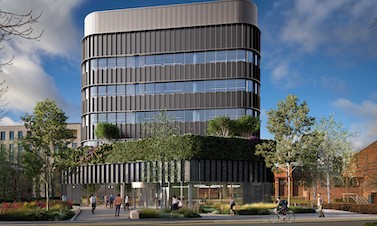Research being used to develop new ways to prevent, diagnose and treat diseases like dementia, Parkinson’s, diabetes and cancer is to benefit from a £16 million boost to upgrade how UK Biobank uses and stores its growing wealth of health data.
UK Biobank, the large biomedical database, is in the process of moving to Bruntwood SciTech’s Manchester Science Park.
UK Research and Innovation’s 2023 £127.6 million investment in UK Biobank’s new headquarters means it is set to open in 2026.
In the latest investment, announced by UK Science and Technology Secretary Peter Kyle on Thursday, Amazon Web Services (AWS) will provide $10 million (around £8 million) worth of cloud computing credits to help ensure UK Biobank has the cloud infrastructure it needs to securely store and handle its unrivalled wealth of health data.
This contribution will give UK Biobank £8 million in AWS credits, providing access to data storage as well as other AWS services, such as AI and machine learning.
This will be matched by a further £8 million in UK government investment, and forms part of the public, private and philanthropic group set up to keep the world-leading facility at the forefront of medical research.
In October last year, a public-philanthropic consortium was set up to ensure UK Biobank’s long-term future, with initial funding donated by billionaires Eric Schmidt and Ken Griffin, and matched by the UK government to a total of £32 million.
The latest investment means almost £50 million backing has now been achieved for UK Biobank.
UK Biobank is the world’s most advanced source of data for health research, helping the life sciences sector to transform healthcare for people across the UK and worldwide.
It is a database of in-depth genetic, health and lifestyle information from half a million UK volunteers. Researchers worldwide can apply to access to an unparalleled volume of de-identified and secure data, and are using it to enable medical breakthroughs, from detecting cardiac disease earlier, to developing tests for Alzheimer’s.
De-identified UK Biobank data is already accessible, securely and worldwide, for approved researchers on the UK Biobank Research Analysis platform, which is hosted on AWS and enabled by DNAnexus.
John Davies, Director, UK Public Sector at Amazon Web Services, said: “We are delighted that UK Biobank is extending its use of the AWS Cloud to give approved researchers around the world access to the vital data that will support medical breakthroughs. UK Biobank has the largest dataset of whole genome sequences in the world, with data from an aging cohort that is almost 20 years old.
“In using AWS, UK Biobank is able to store this vast amount of health data securely, and scale up the data platform quickly and easily, as more data is added in the future. Using cloud infrastructure to store and access data will also help UK Biobank unlock the benefits of more advanced digital capabilities such as machine learning and artificial intelligence, which will further speed-up research advancements in healthcare.”
Rory Collins, Chief Executive Officer and Principal Investigator of UK Biobank, said: “This contribution will make our participants very happy, as it means the data they have provided can be used by even more researchers around the world. We are truly grateful for this contribution from Amazon Web Services and the UK government.
“This means vital data can be accessed by researchers from less wealthy countries, or who are starting out in research, as well as those at large universities, charities and companies. By bringing together so many researchers, with different viewpoints and questions, to investigate the data, we have a much better chance of helping improve the lives of everyone, everywhere.”
Mayor of Greater Manchester, Andy Burnham, said: “UK Biobank isn’t just a major asset for Greater Manchester’s health and life sciences sector – it’s one of the most important health research facilities in the world. Its database plays a vital role in enabling new discoveries that improve public health, and the work done there shows what can be achieved when academia, the public and private sectors come together and use their strengths to address some of our biggest healthcare challenges.”
